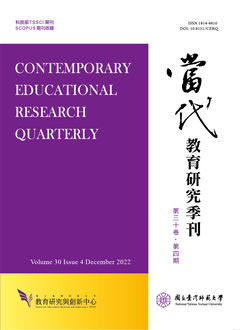

研究目的
2016年,立法院通過《高級中等教育法》修法,課程審議會正式納入「學生代表」引起不小爭議。事實上,為保障兒童權利,臺灣在2014年已通過《兒童權利公約施行法》並於同年11月20日施行,《兒童權利公約》是聯合國目前獲得最迅速和廣泛批准的國際人權公約,多數國家對公約的空前接受度清楚地表明了全球對促進兒童權利的廣泛承諾。有鑑於此波爭議較少從「兒童權利」觀點出發,且為具體呼應我國自願將公約國內法化、與國際人權制度接軌之初衷,於此,本研究旨從聯合國《兒童權利公約》反思我國學生參與課綱審查之重要卻較受忽略的課題。
研究設計/方法/取徑
本研究先就我國自解嚴以來學生參與國家層級課程修訂之背景脈絡進行理解,主要運用法律史的研究方法;其次,就聯合國《兒童權利公約》相關內涵進行簡要分析;最後,再從聯合國《兒童權利公約》反思我國學生參與課程審議的幾個重要課題並提出幾點建議供參。
研究發現或結論
依據《兒童權利公約》的主要概念,兒童與成人具有相同人權,他們並非父母的財產,亦非等待救援的客體,兒童為自己權利的主體,此對學生參與公共事務具正面意涵。公約所闡述的精神和原則要能實現,要有賴家庭、學校,以及為兒童提供服務的機構和其他所有行政單位等能對兒童權利有所認知並予以尊重方有可能,此亟需國人之共同努力。
研究原創性/價值
這項研究在教育領域是初步的,期望為學生參與公共事務提供一個新的詮釋視角。它突顯了將孩子視為個人、家庭和社區成員一份子的眼光,指出兒童具有相宜於其年齡和發展階段的權利和責任。
Purpose
In 2016, the Legislative Yuan passed amendments to the Senior High School Education Act to overhaul the review process for the curriculum guidelines, and Curriculum Deliberation Council (CDC) members formally incorporated into the students’ representatives, which caused controversy among the people of the country. In fact, Taiwan passed the “Implementation Act of the Convention on the Rights of the Child” in 2014, promulgated the Act that year and implemented it on Nov. 20 the same year. The Convention on the Rights of the Child (CRC) is the most rapidly and widely ratified international human rights treaty in history. The unprecedented acceptance of the Convention clearly shows a wide global commitment to advancing children’s rights. With this wave of controversy rarely inspected from the perspective of "children's rights", coupled with the response to the domestication of the CRC, this study focuses on exploring important but suspended lessons on students’ participation in CDC from the rights of the child recognized in the CRC.
Design/methodology/approach
The study applied the research method of law history to trace Taiwan students’ participation in national-level curriculum decision-making after the termination of martial law. It also briefly reviewed the context and content of the CRC, followed by some reflections on Taiwan students’ participation in CDC from the rights of the child recognized in the CRC.
Findings
According to the main concept of CRC, children have the same general human rights as adults; they are not the property of their parents nor the objects of waiting for the rescue, but the subject of their own rights. These big ideas have positive implications for students' participation in public affairs. The spiritand principles articulated in the CRC can only become a reality when they are respected by everyone—within the family, in schools and other institutions that provide services for children, in communities and at all levels of administration. Based on that, the most urgent response of our people now is to recognize and clarify the concept of human rights and take further wise action.
Originality/value
This study is preliminary in the field of education and looks forward to providing a new perspective on students' participation in public affairs. It offers a vision of the child as an individual and as a member of a family and community, with rights and responsibilities appropriate to his or her age and stage of development.

本著作係採用創用 CC 姓名標示-非商業性 3.0 台灣 授權條款授權.
本刊國立台灣師範大學教育研究與創新中心
106台北市和平東路一段162號 | 電話: 02-7749-3670 | E-mail: cerecerq@gmail.com
教創中心 | 師大 | 電子報 | 線上投審系統
本刊由國家科學及技術委員會人文社會科學研究中心補助經費
© 2014 CERI-NTNU
